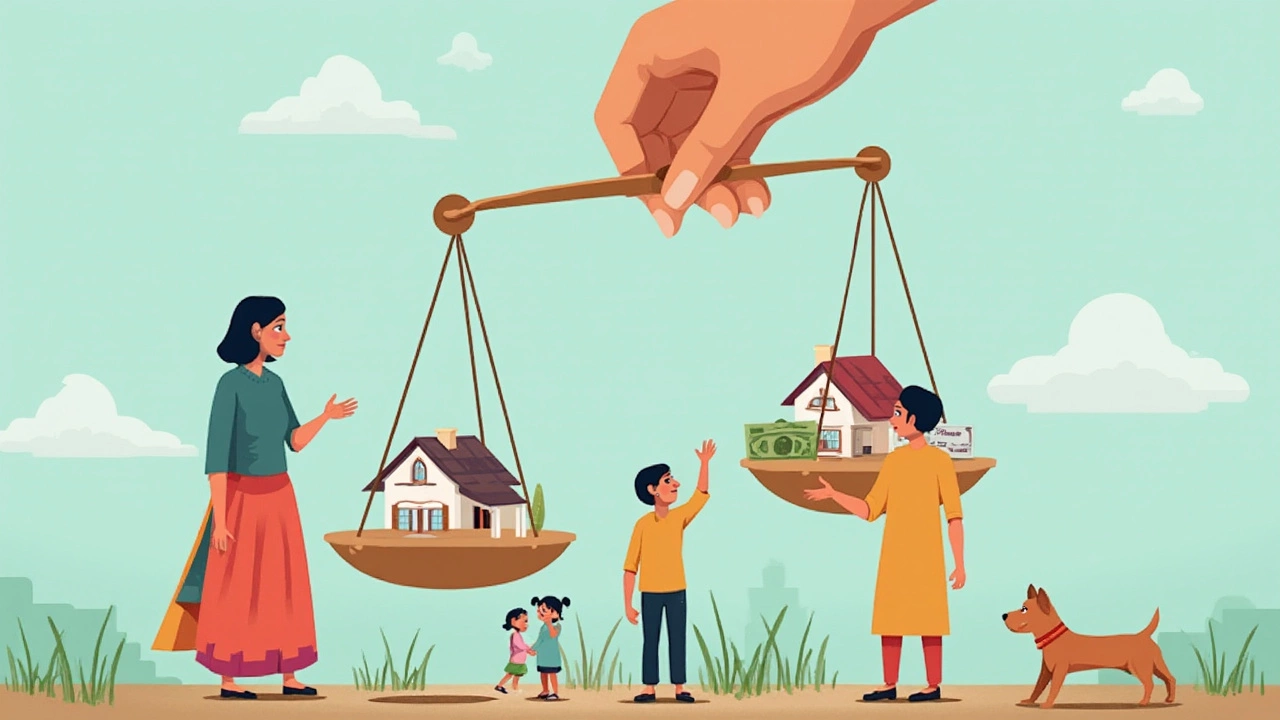Thinking about divorce? You're probably wondering what you'll have to give up—and how deep the losses might go. First, you’re not alone. Most people imagine empty bank accounts, sold homes, and life turned upside down, but the truth is a lot more specific (and sometimes, less scary) than the horror stories out there. Divorce can hit your money, your relationships, your living situation, and yes, even your furry companions like my Max.
If you're worried about losing the house, half your stuff, or precious time with your kids, you're smart to ask these questions now. What you end up losing—or keeping—depends on your state’s laws and what you've both agreed on in the past. Some couples split everything down the middle; for others, it's a negotiation battle over every detail. Assets, debts, and even shared subscriptions might come under the microscope.
But here's a fact a lot of folks miss: the less you fight, the more you keep. Dragging things through court? That costs extra—both cash and peace of mind. A messy split can mean legal bills that eat into what you thought you’d keep. It's not just about what the law says—it's also about what you’re willing to compromise on to get the process done quicker and with less drama.
- Splitting Money and Property
- What Happens to the Kids
- Handling Debt and Bills
- Impact on Pets and Personal Belongings
- New Realities: Social Circles and Mental Health
- Smart Moves to Protect Yourself
Splitting Money and Property
This is where divorce often gets the most heated. Under U.S. law, assets you and your spouse got during the marriage—like savings, cars, and the house—usually get split up. What you owned before you tied the knot, or anything given just to you (like an inheritance), is often considered separate, so you generally keep that. But the details can trip people up.
There are two main ways states split stuff: community property and equitable distribution. In community property states (think California, Texas, Nevada, and about seven others), you straight-up split joint assets 50/50. In equitable distribution states, the court tries to make things "fair," not necessarily equal. That means one person might get a bigger chunk if they need it (like for child care), or if they didn't earn as much during the marriage.
Here’s a quick look at how a typical split might go, based on what each person contributed and what the court sees as fair:
| Asset | Community Property State | Equitable Distribution State |
|---|---|---|
| House (purchased together) | 50/50 split | May split 60/40 or even 70/30 |
| 401(k) built during marriage | Each gets half | Depends—could favor non-earning spouse |
| Debts (credit cards, loans) | Both are liable for half | Split according to ability to pay |
Retirement savings, stock portfolios, even your favorite coffee maker—it can all be counted. If it feels overwhelming, you're not wrong. But here's a big tip: a detailed list (just jot it in your phone) of every shared asset and debt will save you hours and legal fees down the road.
If you’re worried about losing big-ticket items, try making a deal you can live with instead of letting the court decide for you. The more you two agree on (even with strong feelings involved), the more you both walk away with. And don’t forget about taxes—sometimes, cashing out or selling assets like the house or stocks comes with a big tax bill the following April. Nobody wants that surprise.
Bottom line: Know what’s on the table, understand how your state handles divorce, and get your paperwork organized early. If anything feels confusing (and it probably will), getting advice from a family law attorney just to review the numbers is rarely a waste of money.
What Happens to the Kids
If you’ve got kids and you’re headed for divorce, this is usually the single toughest part. Most parents worry about losing time with their children, not just money or property. In fact, almost every state’s laws put the child’s best interests first, not the preferences of either parent.
So how does custody usually work? Courts look at stuff like each parent’s involvement, stability, and ability to provide a safe home. They look at school arrangements, schedules, and sometimes, if the kid is old enough, what the kid wants. Full custody is rare unless one parent is unfit for some reason—think safety risks, neglect, or serious addiction.
If you’re hoping for a predictable answer, check this out: a 2024 survey from the American Academy of Matrimonial Lawyers found that joint custody is now the most common arrangement, with about 62% of recent cases resulting in shared parenting time.
| Custody Type | Percentage (2024 US Data) |
|---|---|
| Joint (Shared) | 62% |
| Mother Sole Custody | 25% |
| Father Sole Custody | 9% |
| Other/Grandparent custody | 4% |
Visitation comes next. If one parent gets primary custody, the other typically has a schedule for weekends, holidays, or mid-week visits. Courts want both parents involved, unless there’s a real reason to limit contact.
"Children whose divorcing parents cooperate and stay involved in their lives tend to have fewer emotional and behavioral problems," says Dr. Katherine Rosenblum, a child psychology professor at the University of Michigan.
Here are a few practical things you can do right now:
- Start documenting your involvement—school pickups, doctor visits, sports and activities.
- Keep it positive with your ex, especially around your kids. Judges notice cooperation.
- Consider a parenting plan—write out your ideal arrangement and where you’re willing to compromise.
- Don’t badmouth your co-parent to your kids. It rarely helps and can backfire big time in court.
Bottom line: Don’t expect to "win" the kids, but do expect the court to look at what works best for them. Show that you’re able to co-parent and keep their life as stable as possible—judges love to see that.
Handling Debt and Bills
If you’re splitting up, you’re not just dividing savings and property—debt and monthly bills come right along for the ride. Here’s a simple truth: divorce won’t erase debts. Both people are usually still on the hook for anything signed together, like mortgages or joint credit cards.
Who pays what? That depends on what the judge decides, your state’s rules, and if you work it out privately. In community property states like California and Texas, most debts racked up during marriage get split 50/50, no matter who made the charges. In other states, judges might look at who benefited more from a particular purchase or loan.
A quick look at how debts are often treated:
| Debt Type | Common Split |
|---|---|
| Joint Credit Cards | Usually divided equally unless you prove your spouse racked up the bill solo |
| Mortgage | Depends on ownership and who stays in the home |
| Car Loans | Often goes with whoever keeps the car |
| Student Loans | Usually stays with the person who took out the loan, unless used for family expenses |
But here’s where a lot of people get burned: even if your ex agrees to pay a shared debt, lenders can still come after you if your name’s still on the account. That means if your ex misses payments after the divorce, your own credit could get trashed too. It’s smart to close or refinance any joint accounts, and make a clean break financially.
According to Experian, "Divorce does not directly affect your credit score, but splitting joint accounts the wrong way can mess things up fast."
"While divorce decrees may outline who is responsible for making payments, lenders are not required to follow this. If your name is still on the account, you are still legally responsible." – Experian, 2024
Here’s what you can do to avoid messy surprises:
- List every debt—credit cards, loans, utilities—along with whose name is on each.
- Try to pay off joint debts before finalizing the divorce, or see if you can refinance anything in one name.
- Change passwords on shared accounts and stop using joint credit now.
- Monitor your credit score frequently for any surprise missed payments.
Money issues are usually the battlefield of divorce. Sorting this out early can save you big headaches down the line, especially when it comes to protecting your divorce finances and keeping your credit on track.

Impact on Pets and Personal Belongings
Let’s talk about the stuff you might not think about right away: pets and all the personal things you’ve collected over the years. The law doesn’t work the same way with pets as it does with children. In most states, pets are considered property—like your couch or your car. Sounds a bit harsh, right? But that’s how the courts usually decide who gets the dog or cat. For example, the American Bar Association points out,
"While pets hold a special place in many homes, most courts still treat animals as personal property rather than family members during divorce."That means judges will look at who paid the adoption fee, who covers vet bills, or even whose name is on the microchip registration.
If you and your ex can agree on a plan for the pets (co-pawrenting is a real thing!), the court’s more likely to sign off on it. But if you can’t, one of you might end up forced to say goodbye—even if both of you love your dog as much as I love Max. A tip? Collect proof of who spends more time and money on the pet—that could swing things your way if things get messy.
Personal belongings can be another shock. Think gaming systems, laptops, that lucky mug from college, even family photos. Usually, anything you bought before getting married is yours to keep. Stuff you got while married? That gets tossed into the pool of things to split. Here’s what usually happens:
- Each person lists personal belongings—furniture, electronics, jewelry, collections, and even sports gear.
- Both sides decide what’s truly personal (like your old baseball glove) and what’s joint (like the new 75-inch TV you both chipped in for).
- You and your ex either work out who gets what, or let a judge decide if you can’t agree.
One thing to note: sentimental value means nothing in court. That old photo album you love is legally no different from a blender. If you care about keeping something, speak up early and try to swap for it. And remember, emotional battles over ‘stuff’ can rack up big legal bills fast. If you can keep negotiations civil, you’ll save money and stress.
End of the day, divorce reshuffles a lot more than joint bank accounts. Getting clear about what really matters to you—pet or personal item—makes it easier to stand your ground when it counts.
New Realities: Social Circles and Mental Health
Divorce messes with way more than just your finances or your living space—it can send your social life and peace of mind for a spin. Friends you hung out with as a couple might suddenly take sides or fade away. It’s actually pretty common: A Stanford study found that one in five mutual friendships disappears after a divorce. Family gatherings can get awkward, and groups you thought would always have your back sometimes drop off the radar.
This social shakeup hits hard when you’re already stressed. It’s not just the social invites either; you could end up losing your go-to support system, which can make stress, anxiety, or even depression tougher to handle. The American Psychological Association points out that people going through divorce are almost three times more likely to deal with mental health struggles than their married buddies.
The good news? People who build new circles and lean on professionals—think therapists, coaches, even a support group—bounce back faster. Here’s how you can start:
- Reconnect with old friends or family members who support you, regardless of which “side” they’re on.
- Explore new hobbies or clubs (even a pickleball league or a dog-walking group) to meet fresh faces.
- Don’t be afraid to reach out for mental health support. Therapy helps more people than most realize, and many towns now offer affordable options.
- Keep routines that make you feel good—like walking the dog, hitting the gym, or catching up with neighbors.
Divorce is a mental health challenge for almost everyone who goes through it. If you’re feeling off, you’re not weird—you’re normal. Here’s a quick glance at how common these issues are:
| Issue | Percentage of Divorced People Affected |
|---|---|
| Short-term mood swings or sadness | 60% |
| Loss of friendships/social support | 40% |
| Major anxiety or depression | 27% |
| Long-term mental health issues | 10% |
The bottom line? Don’t ignore the social and emotional impact of divorce. Protecting your mental health and rebuilding your social life are just as important as figuring out who gets the couch or the car.
Smart Moves to Protect Yourself
If you're staring at divorce papers, don't just sign and hope for the best. There are concrete steps you can take right now to keep from losing more than you need to — especially when it comes to your divorce finances and mental well-being.
- Know Your Assets: Make a list of everything you and your partner own. Bank accounts, retirement savings, cars, the house, even things like expensive electronics or collectibles. Take clear photos of valuable items and keep copies of important documents (bank statements, titles, deeds).
- Track Your Debts: Don’t forget about the credit cards, loans, and even that subscription you both used but only you pay for. Divorce courts often split both assets and debts, so be clear about what’s there.
- Change Your Passwords: Email, banks, streaming, even your online shopping accounts. Protect your privacy before emotions run high.
- Be Careful With Cash: Think before you move, withdraw, or spend large amounts of money. Sudden transfers can look suspicious and might get you in trouble with the judge.
- Document Everything: If you end up in court, having a paper trail helps—texts, emails, photos, receipts. It’s not paranoid; it’s just good sense.
- Don’t Go It Alone: Even if you think things will be friendly, a chat with a solid family law attorney pays off. Most offer free first meetings.
Here’s a quick breakdown to show just how fast costs can add up in a contested versus uncontested divorce:
| Type of Divorce | Average Attorney Fees (USD) | Typical Timeline |
|---|---|---|
| Uncontested | $1,500 - $3,500 | 2-6 months |
| Contested | $7,500 - $20,000+ | 9-18 months (or more) |
If kids are involved, most states want a parenting plan. Start thinking about schedules, holidays, and school issues early—it looks better if you come prepared, not defensive.
Lastly, keep your cool on social media. Judges really do look at Facebook rants and embarrassing posts. When in doubt, keep things private and offline.
If you get organized and ask for help early, you’ll hold on to more of what matters—money, time with your kids, and your sanity.


